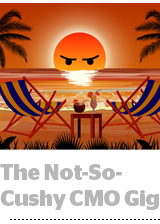 Here’s today’s AdExchanger.com news round-up… Want it by email? Sign up here.
Here’s today’s AdExchanger.com news round-up… Want it by email? Sign up here.
A Bridge Too Far?
Are ISPs collecting customer browsing data for ad targeting purposes? A Wall Street Journal review shows that, with the exception of AT&T, most don’t seem to be doing it. Comcast, Charter, Verizon and Altice are all abstaining for the moment. In the case of Altice USA’s A4 advertising unit, President Paul Haddad said data-driven targeting “requires a lot of intrusion to be able to do it and it doesn’t help.” The company’s alternative approach is to match its household data with external data sources. Verizon also scaled back its addressable advertising ambitions with Verizon Media Group (previously Oath, and AOL and Yahoo before that), in part due to privacy concerns about using ISP location data and mobile device IDs for targeting. In the new privacy age, these companies appear to have decided subscriber-based data segmentation for advertising represents a risk they’d rather not take. More.
Brand-Aid
All CMOs have a tough job these days. But none is quite as tough as Facebook’s Antonio Lucio, who joined the company in late 2018 to repair its reputation after a year of tarnishing scandals around data privacy and election interference. “I came in with eyes wide open,” Lucio told The Drum. “I knew that this was challenging.” Nine months on the job, Lucio is turning to the platform’s biggest brand push to mend its reputation with users. Facebook replaced its creative agency roster for each of its apps and has plans to develop a separate “voice” for the parent brand with Droga5. “Marketing directly to users is rather new to Facebook,” Lucio said. “We’ve never done brand-building the way we are doing it now. Showing what that looks like, convincing people what that looks like and getting the job done within the context of the challenging environment is where I am spending most of my time.” More.
Clear As A Privacy Policy
In another example of its turnaround efforts, Facebook has rewritten its terms of service to give users more details on ad targeting, content removal and intellectual property rights. While the new terms don’t change how the platform operates, they’re an effort by Facebook to make its platform easier to understand, The Verge reports. With help from EU regulators and global privacy experts, the new terms make clearer Facebook’s stance on restricting reach, how to navigate the appeals and review process and user content ownership rights. It also goes into some detail on how the platform targets ads. “We don’t sell your personal data,” the terms state. “We allow advertisers to tell us things like their business goals and the kind of audience they want to see their ads … We then show their ad to people who might be interested.” More.
The Platform Play
When the curated ecommerce site Verishop launched last week, observers doubted whether there’s space for another multi-brand online retailer when Amazon, eBay and Walmart control such large open markets. But there is still plenty of upside for multi-brand platforms, according to 2PM, a commerce news and advisory company. Most billion-plus dollar exits in DTC and ecommerce came from multi-brand platforms, including Net-a-Porter, Chewy, Zulily and Jet.com. Multi-brand players “must pay close attention to unit economics, lowering brand risk, and avoiding gratuitous discounting. This actually becomes an asset to the participating brands, despite the lack of 1:1 connections between them and the customer.” More (with subscription).
But Wait, There’s More
This post was syndicated from Ad Exchanger.


More Stories
2024 Top Women in Media & Ad Tech Honorees and Special Recognition Awards Announced
StopPress exclusive Q&A – oOh! Creativity for Impact
Here’s My Beef With Ad Agencies